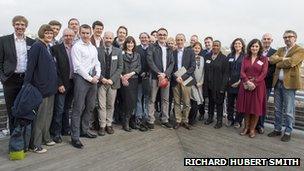Danny Boyle voices regional theatre fears
- Published
Danny Boyle tells the BBC's Will Gompertz that theatres deserve to be heard
Danny Boyle has requested a meeting with the prime minister to make the case for regional theatres, with venues at risk of closure from budget cuts.
On Thursday, he joined artistic directors from theatres across England to highlight their plight.
Boyle said he and Olympic Opening Ceremony collaborator Stephen Daldry hoped to ask David Cameron for "modest but sustained investment in the arts".
"The return that you get from it is incalculable," he told the BBC.
"Theatre sustains local communities and does very positive things for local economies. But it also gives a sense of belonging that can result in big expressions like the opening ceremony."
Speaking at the National Theatre in London, Boyle was joined by 23 artistic and executive directors from theatres up and down England.
Many theatres have seen their funding reduced by both the Arts Council England and local authorities, with the prospect of more cuts to come.
Theatres are having to argue their case as local authorities slash day-to-day services and with the government's grant to the Arts Council reduced by 30%.
Thursday's press conference was Boyle's first public appearance since earning near-universal acclaim for his opening ceremony.
He said theatres were the "modest cousins" of football, cinema and music.
"What they provide is something else to believe in, and we must believe as well, otherwise we'll lose it," he said.
Boyle recalled how he caught the "theatre bug" while working as an usher at the Octagon Theatre in Bolton in his youth.
The Octagon's current artistic director David Thacker told reporters: "The kind of theatres we're passionately committed to are in very, very serious danger at the moment.
"A small further cut could have catastrophic effect."
Roxana Silbert, artistic director of the Birmingham Rep, said of the gathering: "We're here because we believe that we may not all survive, and we have lost a lot of regional theatres already."

Boyle joined 23 regional artistic and executive directors at the National Theatre in London
The Birmingham Rep has acquired a 300-seat studio, as well as having its main 900-set theatre, which is currently undergoing refurbishment, she said.
"The cuts that we're looking at, purely from the city council, equal £350,000 when we re-open next year. That means that studio will not open. We will not be able to produce work, nor will we be able to receive work because receiving work costs money.
"We cannot support other people's work nor can we produce our own. We will have a 900-seat theatre with quite a commercial bias and the kind of work that we all love doing will not grow in our city."
Erica Whyman, artistic director of Northern Stage in Newcastle, revealed that Newcastle City Council was considering cutting its entire arts budget over the next three years.
But councils are having to weigh up their arts funding at a time when other services such as adult social care, child protection, collecting bins and filling potholes are being cut.
Local Government Association culture chair Flick Rea said: "Councils are having to bear the brunt of public sector cuts with government reducing their funding by 28%.
"Once statutory duties such as caring for the elderly, protecting children, collecting bins and filling potholes have been covered, many town halls have little option but to reduce what they used to spend on discretionary areas such as the arts."
Arts Council England chief executive Alan Davey told BBC Radio 4's Today programme he was "worried about the regions".
"I'm worried because of the pressure on local government," he said. "Funding the regions to thrive is, I think, going to be part of the next spending settlement when we know how much we've got. And that might mean some difficult decisions."
A Downing Street spokesperson said: "The government is wholly committed to arts and culture and ministers are determined to do everything they can to make sure they get through this difficult period without long term damage.
"We are doing this by prioritising funding going to create and share great art."
- Published29 October 2012
- Published23 April 2012